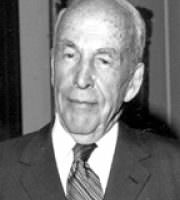About Archibald MacLeish
Archibald MacLeish (May 7, 1892 – April 20, 1982) was an American poet, writer, and the Librarian of Congress. He is associated with the Modernist school of poetry. He won three Pulitzer Prizes: in 1932 for the narrative poem Conquistador, in 1953 for Collected Poems: 1917–1952 (which won a National Book Award and the Bollingen Prize in that year), and in 1959 for his verse-drama J.B., based on the Book of Job. In 1965 he received an Academy Award for his work on the screenplay of The Eleanor Roosevelt Story.He served as Librarian until 1944. He was appointed by President Franklin D. Roosevelt to serve first as librarian of at the Library of Congress and later as director of the War Department’s Office of Information. In 1945, MacLeish went to the State Department as an assistant secretary of state for cultural affairs, then helped draft a constitution for UNESCO and served on its executive council. From 1949 forward, he wrote poetry and plays and taught. He served in the mid-1950s as president of the American Academy of Arts and Letters.
Archibald MacLeish wrote poems reflecting on the timeless paradoxes of being human: He also acted as a Socratic voice, pricking the consciences of his fellow citizens, and he was perhaps the only poet of the early 20th century who grasped and wrote about the modern revolution in physics, the space-time continuum, and the four-dimensional universe. Considered a major modernist poet of the generation following Ezra Pound and T. S. Eliot, MacLeish, with his sensitivity to technique and his lyrical gift, expressed common existential anxieties of the time. No poem has expressed the modernist sense of art so well as Ars Poetica (1926), with its signature statement: (A poem should not mean / But be.) MacLeish’s poetry presents a rare wholeness of vision throughout his long career, reiterating the value of the real, the tangible experience of one’s impressions and sensations. He distrusted abstractions, in the political arena no less than in the aesthetic. Unlike Pound and Eliot, he did not write for posterity nor for an elite, writing instead as one person to another, specifically as an American. “The poet’s best work is elegiac,” as Donald Hall has remarked, “with a special rage for emptiness, for blank faces at the edge of the void. While we fear or dread annihilation, [MacLeish’s] lines make their music”. In the one-sentence sonnet “The End of the World” (1926), which ends with the lines “There in the sudden blackness the black pall / Of nothing, nothing, nothing—nothing at all,” MacLeish depicts our sense of dispossession, in which there are no answers to the ceaseless unfolding mysteries, and exhorts us to rely on the power of the spiritual within our own minds. With its images able to be experienced directly, MacLeish’s poetry pins down instances of the emotion rather than analogues of it, making us believe more than we can prove of the future of the human race, namely that we can make a future, shape a destiny. In the midst of often incredulous and cynical times, his achievement lies in the new ways he found to state what we have always known.
MacLeish was awarded the Presidential Medal of Freedom in 1977 and the National Medal for Literature in 1978. He died, in Boston, in 1982.
Browse all poems and texts published on Archibald MacLeish









